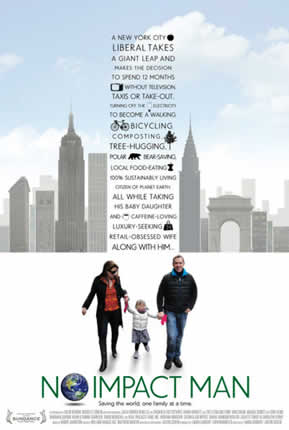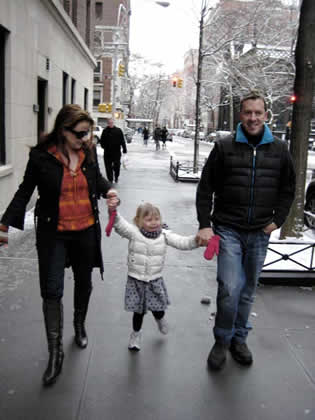 A couple of weeks ago, Green Screens, the Film Society of Lincoln Center’s film series about all things sustainable, returned after the summer break with a pre-release screening of NO IMPACT MAN – a documentary by Laura Gabbert and Justin Schein.
A couple of weeks ago, Green Screens, the Film Society of Lincoln Center’s film series about all things sustainable, returned after the summer break with a pre-release screening of NO IMPACT MAN – a documentary by Laura Gabbert and Justin Schein.
This high concept documentary in the line of Morgan Spurlock’s SUPERSIZE ME, features Colin Beavan and his family as they set out to turn into a carbon neutral family within a year.
Over the course of a year, the film-team follows Colin, his wife Michelle and their daughter Isabella as they embark on their adventure and experience a number of trials, tribulations and triumphs.
To ease into the process, and to increase the dramatic arc, the Beavans’ behavior changes are introduced in stages – they gradually phases out old habits while introducing new, more sustainable ones.
In Michelle, Colin’s dedicated yet consummate consumer wife (or as she calls herself “high fructose corn syrup-addicted-meat-eating-take-out-junky”) the film finds a fantastic protagonist—at first resistant and at times even resentful, she eventually becomes a total advocate and supporter of her husband’s endeavors.
NO IMPACT MAN proves to be an entertaining and encouraging film. Sharing the ups and downs of this experiment with a wider audience, the Beavans demonstrate that change is possible. And one does not have to follow Colin and his family all the way, because even smaller steps do make a difference.
After the screening, the team was present for a Q&A. Filmmakers Gabbert and Schein explained that Colin Beavan only agreed to have them accompany him and his family under one condition: that the film be made as environmentally friendly as possible.
That meant no taxi rides with equipment, no use of elevators, no disposable batteries, no use of additional light (only what was available on site), and—once the power in  Beavans’ apartment was switched off—only the power available from the solar panel that Colin set up on the roof of his apartment to feed his computer. Schein admitted that it took a little reorganization, but as a verite documentary already does without a large crew and any unnecessary equipment, this was not too hard to accomplish. However, producing feature films in a sustainable way is a lot more challenging.
Beavans’ apartment was switched off—only the power available from the solar panel that Colin set up on the roof of his apartment to feed his computer. Schein admitted that it took a little reorganization, but as a verite documentary already does without a large crew and any unnecessary equipment, this was not too hard to accomplish. However, producing feature films in a sustainable way is a lot more challenging.
When Colin and Michelle were asked which of their new habits they kept after the year was over, they answered that they continue to buy locally, shop at the farmers market, ride their bikes, bring their own cups to their local coffee place and keep planting and harvesting at the community garden.
Besides lowering their carbon footprint, Colin Beavan emphasized how much this “experiment” brought the family together – not only did everyone eat more healthy, but they also spend much more time together as a family: losing the TV, riding bikes instead of using public transport, shopping locally, starting a vegetable garden and cooking at home rather than eating out; all of these changes contributed to a healthier lifestyle but also to a wholesome family life.
To close the discussion, one audience member asked Colin what he would change if he could alter one thing in his life and Colin answered that he would like to become involved in an environmental non-profit organization.
For more information on local environmental organizations, the film, and suggestions for reducing one’s carbon footprint, please visit Colin Beavan’s website: www.noimpactman.typepad.com

